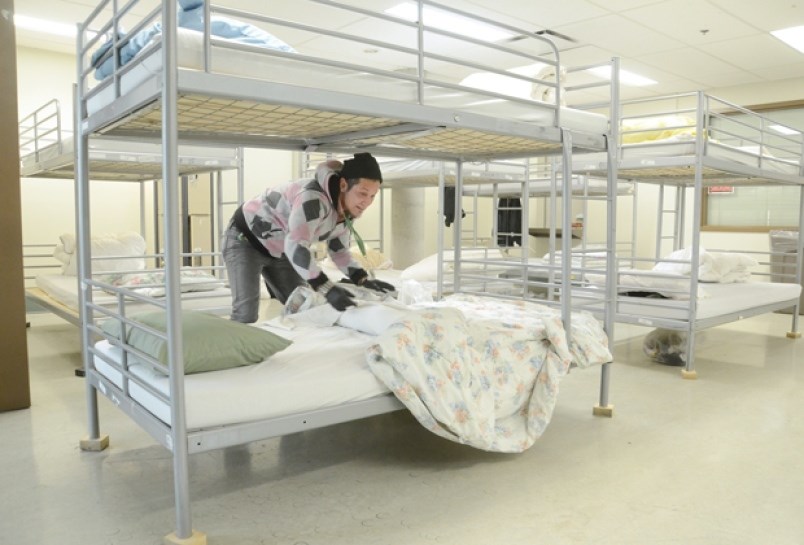Within a matter of weeks, the City of Burnaby could finally have warming centres and a winter shelter for homeless people, after years of advocacy that fell on the deaf ears of the city’s former mayor.
“We’re overjoyed,” said Karen O’ Shannacery, with Burnaby’s Society to End Homelessness. “Homelessness is deadly ... and to be able to look forward to the opening of a shelter or a warming centre – anything to help people stay alive and get basic needs met – is just incredibly awesome news.”
The society, formerly the Burnaby Task Force on Homelessness, has been pushing for these life-saving facilities since 2005, O’Shannecary said, but it took the election of Mayor Mike Hurley for shelters to appear on the agenda.
On Monday, city council unanimously passed a motion directing staff to move forward with a plan to establish a warming centre in each of the city’s four quadrants and a temporary emergency shelter as soon as possible. Exact locations have not been set.
“It’s not humane to leave people out in these kinds of conditions,” said Coun. Pietro Calendino after introducing the motion as an hours-long downpour pelted the windows of council chambers.
In other cities (including Vancouver), warming centres are opened during cold and wet weather. They typically provide hot food and a space to warm up and get dry. They sometimes include temporary overnight accommodation.
Temporary emergency shelters are generally operated by a non-profit with money from B.C. Housing and open 24 hours a day, seven days a week during the winter months. “These facilities offer overnight beds, food, washrooms and some common space for residents of the shelter,” a City of Burnaby staff report states.
Since 2005, Burnaby has had an extreme weather shelter open at Westminster Bible Chapel on Sixth Street (with Burnaby Alliance Church serving as a backup) on the coldest and wettest nights. But that shelter has only been open when temperatures drop below freezing or during prolonged inclement weather.
Last year, the extreme weather shelter was open 51 nights, with an average of eight people each night, according to the city. During the harsh winter of 2016-17, the shelter was open for a record 76 nights, providing a total of 709 bed-nights to the city’s most vulnerable residents.
But the inconsistency of that shelter failed to serve the needs of many of Burnaby’s homeless, O'Shannacery said. It could be open one night, when temperatures hovered around -2 C, but closed the next if the thermometer rose to 2 C, she said.
That left many people at the risk of pneumonia and other respiratory conditions, she said.
(In 2017, Metro Vancouver counted 69 homeless people in the city in what is believed to be a significant undercount.)
On Thursday, Hurley said he expects the first warming centre to be open within a couple weeks.
“I've been pushing the urgency of getting something up and running as we're getting right into the jaws of winter here,” he said. “My concern is that people are not out on the street.”
The recently retired firefighter, who was sworn into office Nov. 5, said the issue is personal to him.
“My last two years on the fire service, for me, were quite heartbreaking to see people out on the street freezing in parks,” he said.
A temporary shelter open 24 hours a day is next on the list. O'Shannacery said such a facility is “an extremely high priority.” It could provide food, hygiene and the opportunity for people to begin building relationships with the people and services that may be able to help them, she said.
O’Shannecary said homelessness advocates in the city are “incredibly happy” with Hurley’s approach to the issue.
“For the mayor to be working on this so quickly after the election, it’s a big difference,” O'Shannacery said.
Corrigan, who served as mayor for 16 years before losing to Hurley, was long opposed to homeless shelters in the city, saying they were unnecessary. In 2013, he maligned homeless people as the type to pull out your gold fillings should they find you dying on the sidewalk.
Further down the road, the city plans to work towards having a permanent shelter.
“This would be a longer term option requiring several years or more to achieve,” according to the city report.
While some communities have pushed back against facilities for homeless people, O'Shannacery said she’s confident locals will support these new initiatives.
“We're just really hoping that the generous people of Burnaby are going to welcome this news that is going to help the vulnerable that live amongst us and help the establishment of a temporary shelter, and then we can start working on creating a permanent shelter,” she said.
B.C. Housing is also set to open a 52-unit supportive housing facility on Norland Avenue this spring. Part of the province’s Rapid Response to Homelessness program, the complex will include studio apartments with laundry, life-skills training, health care and meal programs on site.



